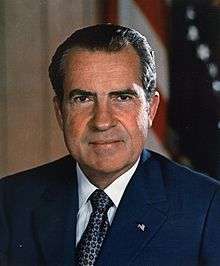Richard Kleindienst
| Richard Kleindienst | |
|---|---|
 | |
| 68th United States Attorney General | |
|
In office June 12, 1972 – April 30, 1973 | |
| President | Richard Nixon |
| Preceded by | John Mitchell |
| Succeeded by | Elliot Richardson |
| United States Deputy Attorney General | |
|
In office January 20, 1969 – June 12, 1972 | |
| President | Richard Nixon |
| Preceded by | Warren Christopher |
| Succeeded by | Ralph Erickson |
| Personal details | |
| Born |
Richard Gordon Kleindienst August 5, 1923 Winslow, Arizona, U.S. |
| Died |
February 3, 2000 (aged 76) Prescott, Arizona, U.S. |
| Political party | Republican |
| Spouse(s) | Margaret Dunbar |
| Alma mater | Harvard University (A.B., J.D.) |
| Religion | Episcopalianism |
| Military service | |
| Allegiance | United States |
| Service/branch |
|
| Years of service | 1943–1946 |
| Unit | United States Army Air Corps |
Richard Gordon Kleindienst (August 5, 1923 – February 3, 2000) was an American lawyer, politician, and a U.S. Attorney General during the Watergate political scandal.[1]
Early life and career
He was born August 5, 1923, in Winslow, Arizona, the son of Gladys (Love) and Alfred R. Kleindienst.[2] He served in the United States Army Air Corps from 1943 to 1946, and attended Harvard College and Harvard Law School, graduating from the latter in 1950.
From 1953 to 1954, he served in the Arizona House of Representatives; he followed that with some 15 years of private legal practice. He concurrently was Arizona Republican Party chairman from 1956 to 1960 and 1961 to 1963, and in 1964, the Republican candidate for Governor of Arizona, losing the general election to Sam Goddard, 53%-47%.
Nixon administration
He suspended his private practice in 1969 to accept the post of Deputy Attorney General of the United States. This gave him responsibilities relating to the government's suit against ITT. Nixon and his aide John Ehrlichman told him to drop the case; this created a presumption that they were violating their obligations under legal ethics, and that, as an attorney himself, Kleindienst was obligated to report these ethical lapses to the state bars in the jurisdictions involved. In his official role he also repeatedly told Congress no one had interfered with his department's handling of the case.
On June 12, 1972, US Atty. Gen. John N. Mitchell resigned to work in the Nixon re-election campaign and President Richard Nixon nominated Kleindienst to succeed Mitchell.
Unknown to Kleindienst, leaders of the Committee to Re-Elect the President (CREEP) had tasked Gordon Liddy with arranging various covert operations, one of which was to be a burglary of a Democratic headquarters in Washington, DC. Before dawn on a Saturday, five days after Kleindienst's nomination, James McCord and four other burglars operating on Liddy's instructions were arrested at Watergate complex. Later in the morning Kleindienst was officially notified of the arrests. Liddy, after a phone consultation about the arrests with CREEP Deputy Director Jeb Magruder (who had managed CREEP up until March of that year, and had the most direct organizational authority over Liddy's activities), personally approached Kleindienst the same day at a private golf club in Bethesda, Maryland. Liddy told him that the break-in had originated within CREEP, and that Kleindienst should arrange the release of the burglars, to reduce the risk of exposure of CREEP's involvement. But Kleindienst refused and ordered that the Watergate burglary investigation proceed like any other case.
Kleindienst resigned in the midst of the Watergate scandal nearly a year later, on April 30, 1973. This was the same day that John Dean was fired and H. R. Haldeman and John Ehrlichman quit.
He returned to private practice. In 1974, he pleaded guilty to failing to testify fully to the Senate in a pre-Watergate investigation, involving alleged favoritism shown to International Telephone & Telegraph Corp, during his testimony in his Senate confirmation hearings.[3]
Later life
In 1982, Kleindienst was accused of having perjured himself to the Arizona Bar regarding how much he knew about a white-collar criminal he represented. He was cleared of all criminal charges brought against him.
He died at the age of 76, of lung cancer, on February 3, 2000.
References
Notes
Bibliography
- Kleindienst, Richard (1985). Justice: The Memoirs of Attorney General Richard Kleindienst. Ottawa, Illinois: Jameson Books. ISBN 0-915463-15-6.
- New York Times digital archive, February 3, 2000, "Richard G. Kleindienst, Figure in Watergate Era, Dies at 76."
- For Kleindienst's limited role in Watergate, see Leon Jaworski, The Right and the Power, and Bob Woodward and Carl Bernstein, All the President's Men. Had he taken more of a role, the break-in would probably never have led to much of a cover-up, except by lower level workers and John Mitchell.
External links
| Party political offices | ||
|---|---|---|
| Preceded by Paul Fannin |
Republican nominee for Governor of Arizona 1964 |
Succeeded by Jack Williams |
| Legal offices | ||
| Preceded by Warren Christopher |
United States Deputy Attorney General 1969–1972 |
Succeeded by Ralph Erickson |
| Preceded by John Mitchell |
United States Attorney General 1972–1973 |
Succeeded by Elliot Richardson |

